
Each year, the Aberdeen Group surveys more than 200 companies to ask them about their new hire onboarding efforts. The report finds that best-in-class companies that offer dynamic onboarding programs enjoy a much higher employee retention rate – and employees reach their goals faster than those at companies without strong programs. Companies that show a commitment to onboarding use tactical and strategic initiatives, a structured approach, in addition to technology throughout the onboarding process. These efforts pay immediate dividends by working to protect an investment in recruiting and employing high performing sales people, helping to provide increased revenue performance; improved client experience; and protecting company brand reputation.
Creating, executing, and maintaining an effective onboarding program takes commitment from the entire organization, including Sales VPs and Human Resource Leaders, particularly when training salespeople involved in long sales cycles for sophisticated offering. Leading B2B organizations today embrace an interdepartmental approach, which uses technology to enhance their onboarding program and enable new sales hires to hit their targets, faster.
Here are six pieces of technology your organization can utilize in your organization’s onboarding plan:
1. Develop a welcome plan
Technology: HR software that offers automated options
New sales employees require an abundance of items: A desk, laptop, business cards, a phone number, accounts login for all the CRM your department uses, access to your virtual private network (VPN), a corporate credit card, a key account and stakeholder list, etc. It’s a long list. Fortunately, the majority of HR cloud services and software packages have onboarding features that can help HR and Sales coordinate everything from tax paperwork to seating assignments and IT. In order to be successful, a checklist of everything your new hire requires on arrival should be developed that incorporates the expertise of all of the departments your new sales hire will interact with – HR, finance, accounting, facilities, etc. Important in this process is ensuring that feedback on the onboarding process is collected from the new employee. The top sales organizations we partner with utilize this information to refine their software’s functionality and the onboarding process. By utilizing HR specific software, organizations’ enhance their ability to orchestrate a smooth first week for their new sales hire, and ultimately generate higher sales, faster.
2. Embrace your new sales hire
Technology: Social media
As soon as the hire is official, start using social media to welcome your new hire to the team. A Harvard Business Review Online article contends that social tools improve the onboarding experience for employees. One of the best tools you can use to help your salesperson get acclimated is LinkedIn – it will serve as a cheat sheet for helping them remember coworker’s names and faces, and also serve as a learning tool to help them make associations with co-workers, particularly those working remotely. Encouraging team members to send the new hire an invitation to connect, or creating a closed group for your department that your new hire can join provides a unique channel through which new sales hires can be introduced to their team.
The LinkedIn group method can also act as a sales learning tool where team members can share selling techniques and insights (for more information on how to great a LinkedIn group, see our reference list) about important selling activities. Unfortunately, many companies have tried – and failed – to make their own proprietary social networking tools, but why re-create the wheel? Using a familiar tool like LinkedIn requires little effort and is efficient. And don’t worry, Facebook fans, Facebook at Work is coming soon.
3. Develop a detailed onboarding plan
Technology: Excel
Word class organizations invest heavily in their onboarding process (Stein and Christiansen, 2010). Sitting a new employee in front of training videos, or providing vague direction on who to talk with about your products or services is a recipe for failure. One of piece of advice we provide clients as part of a structured onboarding process is to devise a discovery roadmap that the employee should follow to learn about their new job, the organization’s sales strategy, and the organization’s selling environment. As noted by Harvard Business Professor, Frank Cespedes, new sales hires “need to learn about the company and how other functions affect, and are affected by, selling behaviors. They don’t need to know how to do other jobs in the firm. But they do need to know what those jobs are and how those activities affect selling.”
Tip: Start with the big picture and drill down to the details, providing the names of people inside and outside of the organization the employee should contact and get to know. You’ll wind up with an agenda for the employee to follow for his or her first few weeks, and your new employee will be able to set appointments and meet people at their speed – an important way to ensure the new salesperson focuses on tasks and selling skills that add immediate value to the team. Your matrix might look like this (in fact, copy and paste it into an Excel spreadsheet and start working on it right now.)
| Practice Area | Contact | When | Topic |
| Company and Product | List various contacts that can sit with the new salesperson and give them a strong overview – include contact phone number so that the employee can call and set an appointment. | Stipulate when this meeting should take place: Within the first few days, first week, first three weeks, etc. | Provide a definitive topic and objectives for each meeting so that the new hire and the contact knows what’s expected. |
| Sales Process | |||
| Resources | |||
| Customers | |||
| Tools and Systems |
4. Training details
Technology: Video
While personal interaction is important for a new employee, there are some tasks that employees will have to learn through video, particularly as they start drilling down into learning the ins and outs of your product or service. In fact, the Society for Human Resource Management’s paper, “Onboarding New Employees: Maximizing Success” promotes the use of a wide variety of learning tools and environments – including video – to help new employees learn. Fortunately, tools are available to make this happen.
Many of our clients have training videos for their customers. Utilizing a video editor to augment existing sales videos with notes and voiceovers that are useful for salespeople to know is just one method of incorporating video into your onboarding process. PowerPoint can also be recorded.
Tip: Have your top sales person walk through a PowerPoint deck, providing selling insights on topics like typical customer encounters, important selling skills, different sales approaches, and success stories. Use PowerPoint’s record functionality and save the presentation for new salespeople.
5. Measure progress
Technology: Gamification
The Aberdeen report found that only 17 percent of organizations apply gaming techniques to the new hire experience – but those who use it improve engagement by 48 percent. Tools as simple and easy as Survey Monkey or TINY Pulse enable organizations to send quick quizzes with feedback options that employees can use. Since the administrator can review the results of the participants, managers are provided another tool to gauge their new hires progress.
only 17 percent of organizations apply gaming techniques to the new hire experience – but those who use it improve engagement by 48 percent.
6. Mastering the client call
Technology: Google Hangouts
Pairing new sales hires with top sellers is one of the most vital exercises of any sales onboarding processes since a new hire can actively learn about effective selling tasks and activities. If selling is done primarily over the phone, consider using Google Hangouts. The technology allows for two-way video communication that can be recorded. Clients are typically more than willing to participate in a video call, particularly if they know there’s a new employee trying to learn (we’ve all been there), and being able to review the play-by-play afterwards with the salesperson is helpful to everyone in the process. Google Hangouts provide yet another technological tool to handle role-playing for sales calls – reviewing video is a great way for an employee to get visual and audio feedback on how they’re doing, and gives their manager an opportunity to pause and replay to reinforce what they did well, and point out where they need improvement.
New employees are eager to learn so they can get selling. By developing and embracing a structured onboarding strategy that utilizes technology to make new hires feel welcome, engage them right away, and set them on a path of learning and socialization, sales managers can feel confident that their new hire will be set up for success.
Need more in-depth information on implementing an effective sales onboarding strategy?
Read our eBook, The First 90 Days – Your Guide to Making New Sales Hires Produce Fast.
References:https://www.peaksalesrecruiting.com/sales-resources/new-sales-rep-onboarding-guide/
Creating a LinkedIn Group, LinkedIn
Facebook at Work, Facebook
Successful Onboarding: Strategies to Unlock Hidden Value Within Your Organization, Mark Stein and Lilith Christiansen
Social Tools can Improve Employee Onboarding, Karie Willyerd
Facebook Developing ‘Facebook at Work’ Service, Says Report, Issie Lapowsky, Wired.com
Onboarding New Employees: Maximizing Success, Tyla N. Bauer, Ph.D, Society for Human Resource Management
relpost-thumb-wrapper
Related posts
close relpost-thumb-wrapper
Eliot Burdett
He co-authored Sales Recruiting 2.0, How to Find Top Performing Sales People, Fast and provides regular insights on sales team management and hiring on the Peak Sales Recruiting Blog.
Latest posts by Eliot Burdett (see all)
- 20 Of Our Favorite Books About Sales Management and Sales Leadership – October 20, 2023
- How To Make Progress On Your Sales Goal Without A Sales Leader – September 15, 2021
- Augment Your Recruiting Strategy During “The Great Resignation” – July 26, 2021








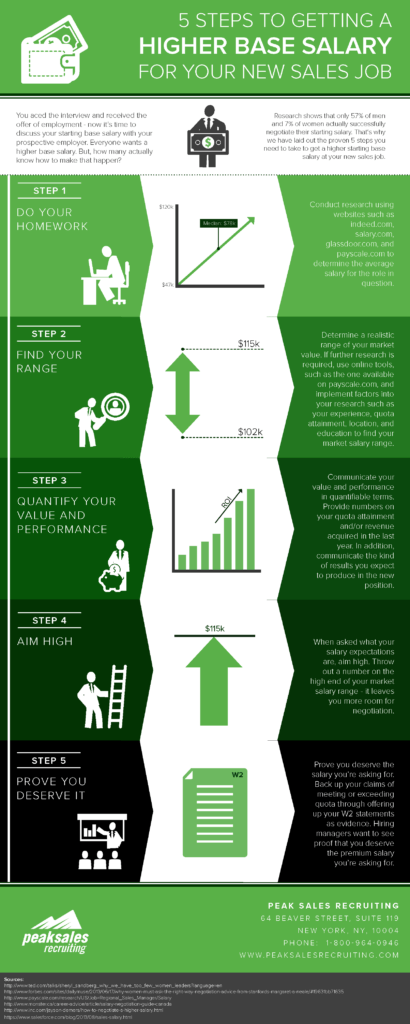





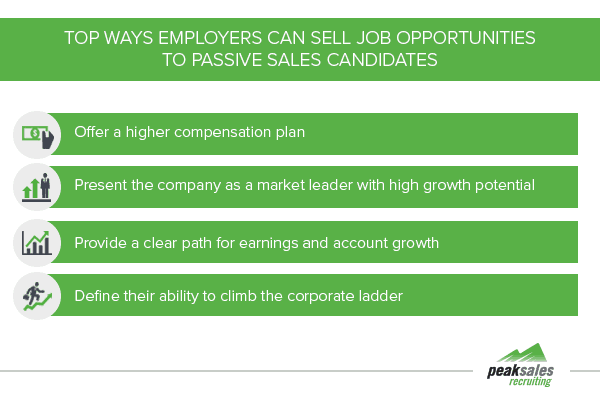


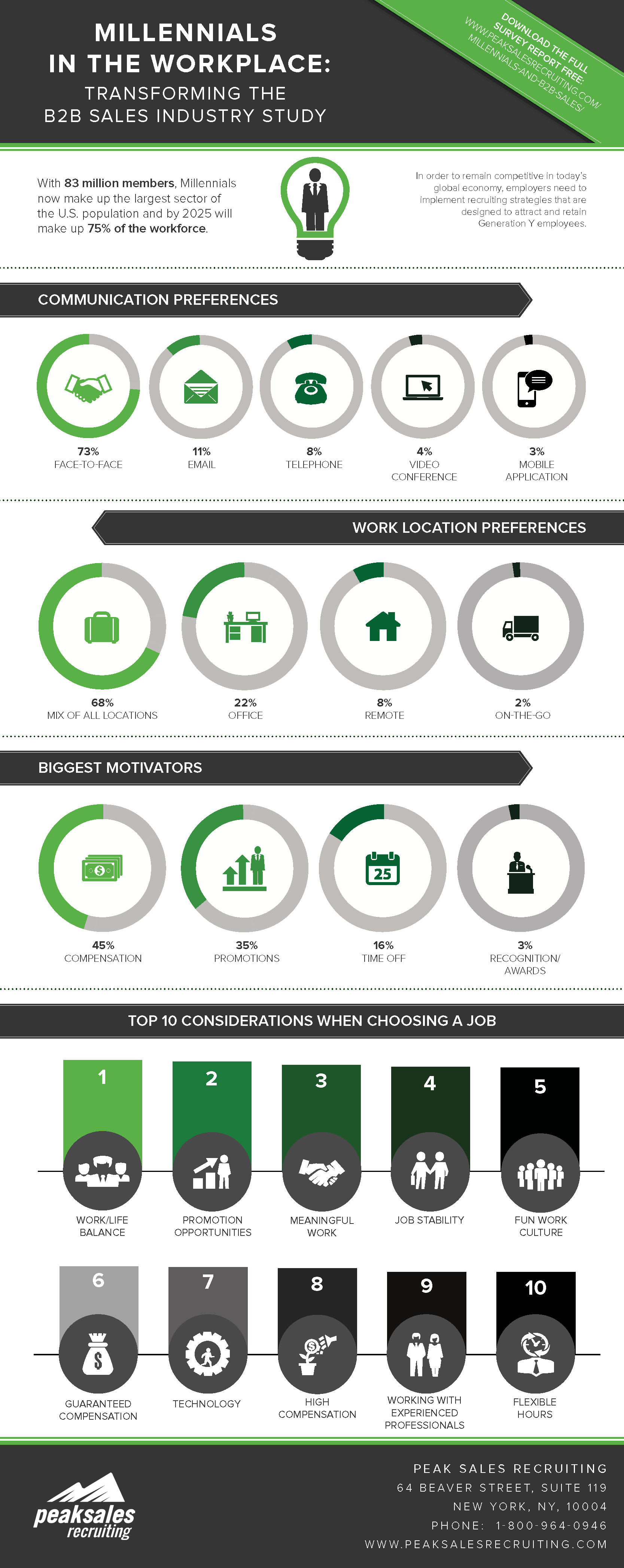

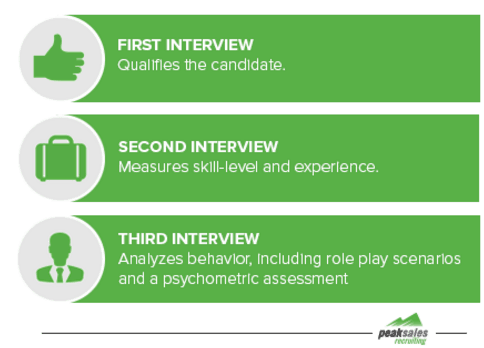







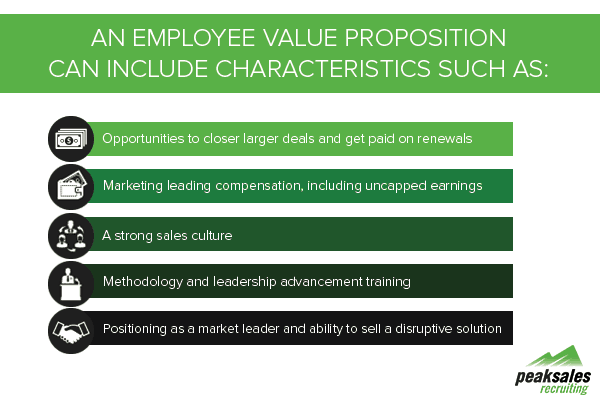

 Peak recently conducted a survey on Millennials, aiming to understand and develop insight into how this generational cohort views and understands B2B sales. The survey revealed that B2B sales is a vocation often overlooked and improperly understood by Millennials. In fact, the study found that 17% of Millennials have no knowledge of what B2B sales is.
Peak recently conducted a survey on Millennials, aiming to understand and develop insight into how this generational cohort views and understands B2B sales. The survey revealed that B2B sales is a vocation often overlooked and improperly understood by Millennials. In fact, the study found that 17% of Millennials have no knowledge of what B2B sales is. ay B2B selling is both conducted and understood. The market research company Marketo notes that 93% of consumers, both B2B and B2C (business-to-consumer), begin their purchase journey online. This should matter to Millennials because it positions this generation as potential workforce leaders because they use and understand technology with more proficiency than any generation before. In fact, David Goldin, founder and CEO of Capify, explains that “
ay B2B selling is both conducted and understood. The market research company Marketo notes that 93% of consumers, both B2B and B2C (business-to-consumer), begin their purchase journey online. This should matter to Millennials because it positions this generation as potential workforce leaders because they use and understand technology with more proficiency than any generation before. In fact, David Goldin, founder and CEO of Capify, explains that “ ompetitiveness Project
ompetitiveness Project